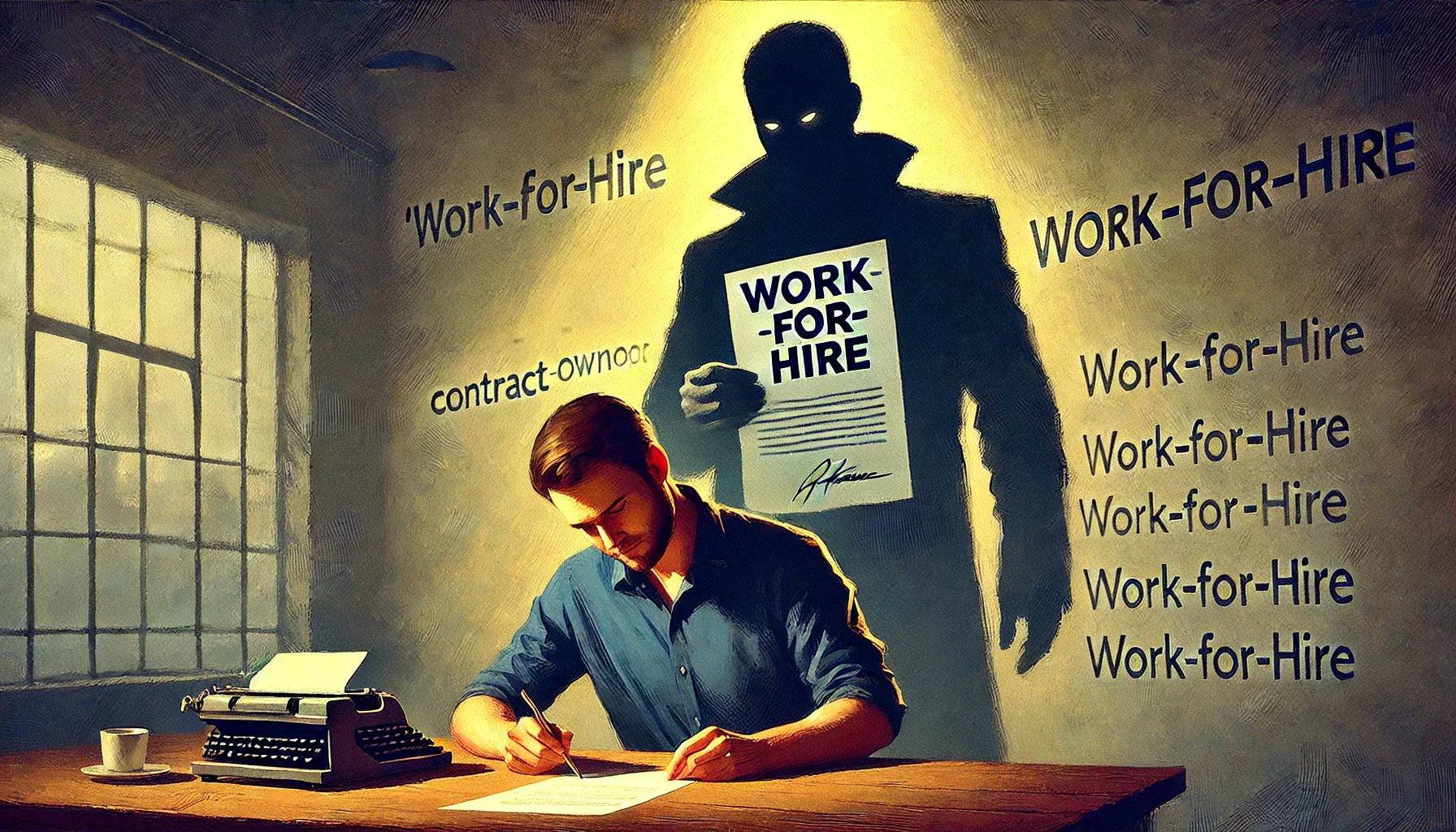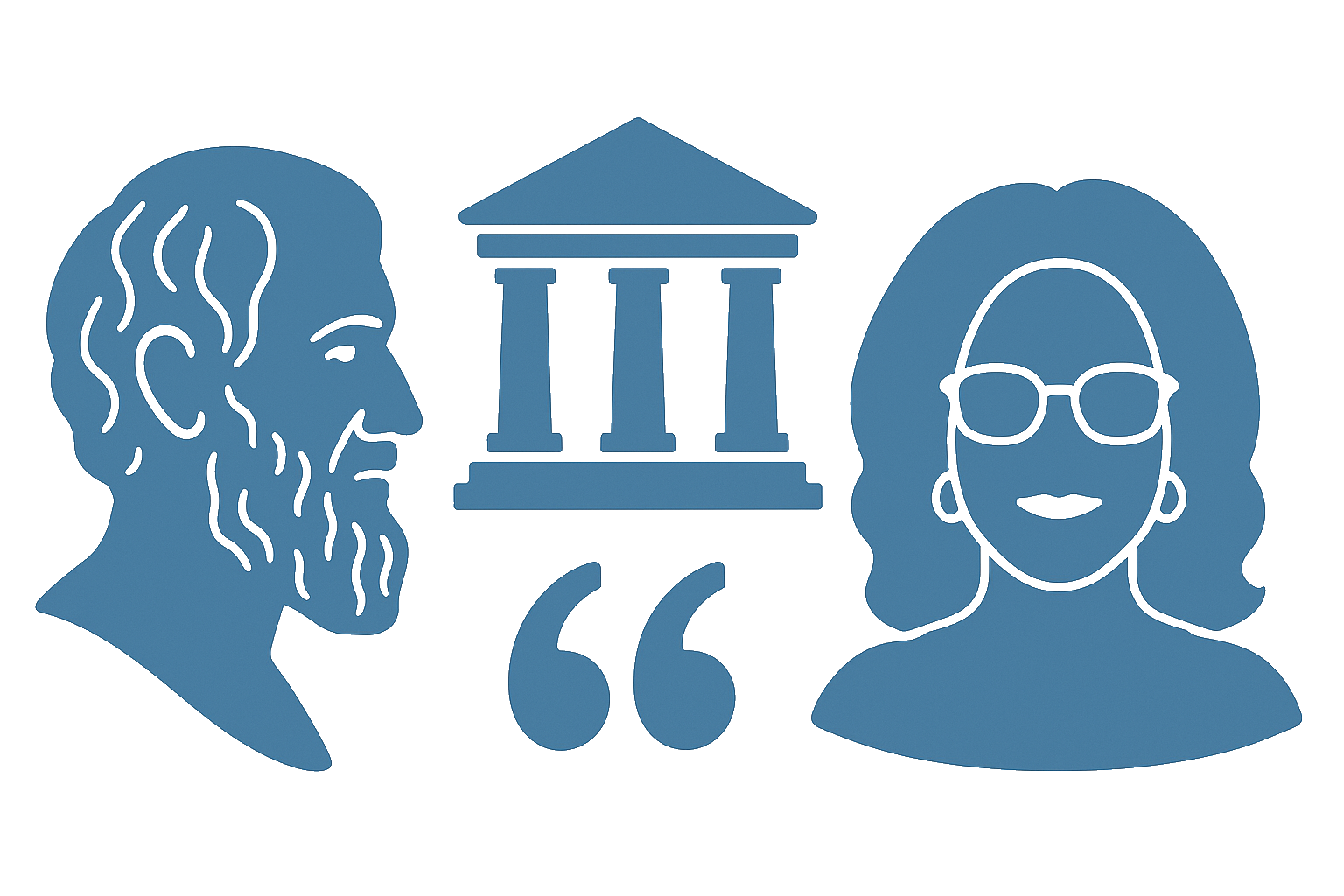Quick Summary
Quick Answer: In "work for hire" agreements, the employer or client—not the creator—owns the copyright to the work produced.
Quick Overview: Work-for-hire contracts can strip creators of copyright ownership, impacting their ability to profit from or reuse their work. Understanding the nuances of these agreements is crucial for freelancers, employees, and businesses to protect their rights and ensure fair compensation.

Common Questions & Answers
-
What is a work-for-hire agreement? A work-for-hire agreement is a contract stating that the employer or client, not the creator, owns the copyright to the work produced.
-
Who does work for hire apply to? It applies to employees creating work within their job duties and freelancers who explicitly sign work-for-hire agreements.
-
Can freelancers automatically lose copyright to their work? No. Without a written agreement specifying work-for-hire terms, freelancers generally retain their copyright.
-
How does work-for-hire impact royalties? Since the creator doesn't own the copyright, they usually forfeit rights to royalties or future profits from the work.
-
Can a work-for-hire agreement be challenged? Yes, if the agreement lacks proper language or doesn’t meet legal requirements, it can be disputed in court.

Step-by-Step Guide: Protecting Your Copyright Rights
-
Read the contract carefully – Ensure you understand whether you're signing away your copyright.
-
Negotiate terms – Request fair compensation if the work-for-hire clause is included.
-
Specify licensing rights instead – Offer limited-use licenses instead of signing over full ownership.
-
Consult an attorney – If unsure, have a lawyer review the contract before signing.
-
Retain ownership by default – If no work-for-hire agreement exists, the creator automatically owns the copyright.
Historical Context
The work-for-hire doctrine has roots in U.S. copyright law, codified in the Copyright Act of 1976. Historically, employers sought to retain ownership of employee-generated work, ensuring companies benefited from creative output. This doctrine was reinforced by legal precedents where courts upheld employer copyright ownership when contracts were explicit. As creative industries expanded, debates over fair compensation and rights protection for independent contractors intensified, shaping modern work-for-hire laws and best practices.
![]()
Business Competition Examples
-
Hollywood Screenwriting – Many scriptwriters work under contracts where studios own their work.
-
Software Development – Companies often retain copyright for code written by employees.
-
Marketing & Branding Agencies – Agencies frequently operate under work-for-hire agreements, ensuring clients own ad campaigns.
-
Ghostwriting Industry – Books and articles are commonly written under work-for-hire contracts, leaving authors without credit.

Discussion
The work-for-hire framework is a double-edged sword. It offers businesses full control over creative output but can exploit creators by stripping them of ownership and residual earnings. Many artists, writers, and software developers unknowingly sign contracts that leave them with no rights to their work. While businesses benefit from legal clarity and asset ownership, creators face challenges in protecting their intellectual property.
What is Work for Hire?
Work for hire refers to a legal doctrine where the employer or commissioning party automatically owns the copyright to a work created by an employee or a contractor under a qualifying written agreement. This concept applies primarily to works created within the scope of employment or under specific categories outlined in U.S. copyright law.
How to Determine if a Work is Work for Hire
A copyrighted material qualifies as work for hire if:
-
It is created by an employee within their official job duties.
-
It is specifically commissioned under a written agreement and falls into one of the designated categories, such as a collective work, motion picture, translation, or instructional text.
-
The contract explicitly states that the work is considered “work for hire.”
Ensuring Ownership at the Time of Hiring
To guarantee ownership of work-for-hire materials:
-
Include a clearly defined work-for-hire clause in the contract before the work begins.
-
Ensure the agreement is signed by both parties.
-
Outline specific deliverables and the scope of copyright ownership within the contract.
-
Keep records of communications confirming the intent to make the work-for-hire arrangement legally binding.
Correcting Ownership If Not Initially Secured
If ownership wasn’t established at the time of hiring:
-
Negotiate a copyright transfer agreement with the creator.
-
Offer compensation or other incentives to acquire the rights.
-
Ensure a formal assignment of copyright is signed and recorded.
What to Do If the Creator Won’t Transfer Ownership
If the original creator refuses to transfer copyright:
-
Evaluate whether the work qualifies as work for hire under the law.
-
Seek legal counsel to determine if a contractual obligation exists.
-
Consider licensing the work instead of purchasing full rights.
-
In cases of dispute, legal proceedings may be required to resolve ownership claims.
Consequences of Not Securing Copyright Ownership
Failing to secure ownership can lead to:
-
Loss of control over how the work is used or modified.
-
The inability to monetize or distribute the work as desired.
-
Potential legal disputes over unauthorized use.
-
Higher costs if later forced to buy back the rights from the creator.
Legal battles, such as disputes over comic book character rights and software ownership conflicts, highlight the dangers of unchecked work-for-hire agreements. Industry professionals must navigate these agreements carefully, balancing financial compensation with long-term creative control.

The Debate
Side 1: Pro Work-for-Hire
-
Provides clarity on ownership for businesses.
-
Ensures companies can profit from and protect their investments.
-
Reduces legal disputes over ownership rights.
Side 2: Against Work-for-Hire
-
Creators lose the ability to profit from their work.
-
Unfair advantage to corporations, limiting creative control.
-
Limits freelancers' ability to build portfolios.

Takeaways
-
Work-for-hire agreements transfer copyright from the creator to the employer.
-
Without a written contract, creators retain ownership by default.
-
Negotiating licensing terms can offer fairer compensation than full transfer.
-
Understanding contract terms is crucial to protecting creative rights.
-
Legal counsel can help clarify and negotiate work-for-hire clauses.

Potential Business Hazards
-
Legal Disputes – Poorly written contracts can lead to costly ownership battles.
-
Loss of Future Earnings – Creators may miss out on royalties and resale opportunities.
-
Brand Reputation Issues – Companies enforcing work-for-hire aggressively may face backlash.
-
Reduced Innovation – Creators may be discouraged from producing high-quality work without ownership incentives.

Myths and Misconceptions
-
"Work for hire applies to all freelancers automatically." – False. It must be explicitly agreed upon in writing.
-
"If I paid for it, I own the copyright." – Not necessarily. Without a contract, the creator retains ownership.
-
"Employees own their work unless stated otherwise." – Wrong. Employers typically own work created within job duties.
-
"Signing a work-for-hire contract means no future rights." – Not always. Some agreements allow limited future use.
-
"I can reclaim rights after a certain time." – Not under work-for-hire agreements; ownership is permanent unless renegotiated.
Book & Podcast Recommendations
-
Copyright Law: A Handbook for Creators – https://www.copyright.gov
-
Freelancer’s Guide to Intellectual Property – https://www.freelancersunion.org
-
The Business of Art and Law Podcast – https://www.artlawpodcast.com
-
Creative Control: Protecting Your Work in a Digital Age – https://www.creativecontrol.com
Legal Cases
-
Marvel v. Kirby – https://www.law.cornell.edu/supct/html
Summary: Dispute over comic book character rights between Marvel and artist Jack Kirby.
Relevance: Clarifies how work-for-hire applies to creative industries. -
CCNV v. Reid – https://supreme.justia.com/cases
Summary: Supreme Court ruled that an independent contractor’s work was not work-for-hire.
Relevance: Highlights the need for explicit contracts in copyright transfers.

Share Your Expertise
For more insights on copyright and intellectual property protection, explore Miller IP’s resources at http://inventiveunicorn.com.

Wrap Up
Understanding work-for-hire agreements is essential for protecting intellectual property. Whether you're an employer or a creator, navigating copyright ownership smartly ensures fair use and compensation. Always read contracts carefully and seek legal advice when needed.













